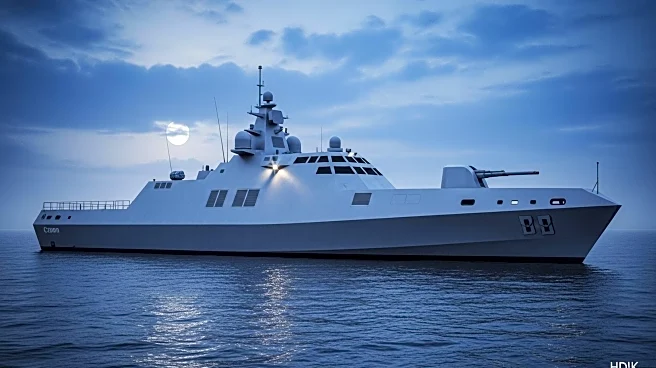What's Happening?
The German Navy is advancing its surface warfare capabilities by planning to acquire unmanned arsenal ships. These vessels, known as Large Remote Missile Vessels (LRMVs), are designed to carry additional missiles and will work alongside the next-generation F127 frigates. The F127 frigates, which are set to replace the F124 Sachsen-class, are modeled after the Arleigh Burke-class destroyers but have fewer vertical launch system (VLS) cells for full-size missiles. The LRMVs will help offset the smaller magazine of the F127 by splitting the typical payload between two platforms, complicating enemy targeting. Germany intends to purchase six F127 frigates and augment them with three unmanned LRMVs. This initiative mirrors similar efforts by the U.S. Navy, which is developing a large-scale unmanned fleet under the Modular Surface Attack Craft (MASC) program.
Why It's Important?
The acquisition of unmanned arsenal ships by the German Navy represents a significant shift in naval warfare strategy, emphasizing the integration of unmanned systems to enhance firepower and operational flexibility. This move aligns with global trends in military innovation, where unmanned systems are increasingly used to augment traditional capabilities. For the U.S., this development underscores the importance of maintaining technological superiority in naval warfare, as other nations adopt similar strategies. The German initiative could influence defense procurement policies and encourage further investment in unmanned technologies, potentially impacting defense contractors and military alliances.
What's Next?
Germany's plan to acquire unmanned arsenal ships is likely to prompt further collaboration and technological exchange with allied nations, including the U.S. As the German Navy progresses with its procurement strategy, it may face challenges related to integration, operational testing, and crew training. The success of this initiative could lead to expanded use of unmanned systems in other areas of military operations, influencing future defense strategies and budget allocations. Additionally, the development of these vessels may stimulate advancements in autonomous maritime technologies, benefiting both military and civilian sectors.
Beyond the Headlines
The introduction of unmanned arsenal ships raises ethical and legal questions regarding the use of autonomous systems in warfare. As these technologies become more prevalent, there will be increased scrutiny on their deployment, rules of engagement, and potential impact on international maritime law. The shift towards unmanned systems also reflects broader cultural changes within military organizations, as they adapt to new technologies and operational paradigms. Long-term, this trend could lead to a reevaluation of naval force structures and the role of human operators in combat scenarios.










